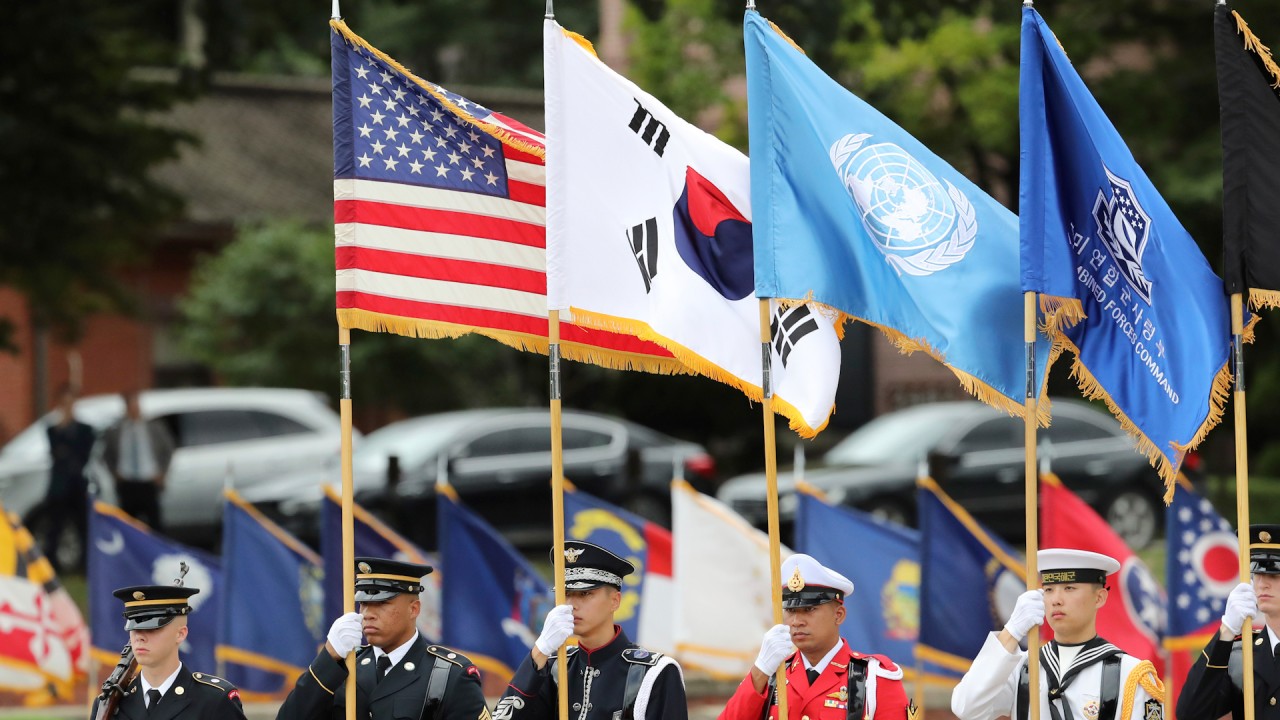
Taiwan on South Korea’s regional defence agenda as military ties grow with US and Japan
- Defence chiefs from South Korea, Japan and the US have put out a statement stressing the ‘importance of peace’ in the Taiwan Strait
- Analysts say though Seoul’s focus is on North Korea, the growing trilateral military ties will see it aligned with America over Taiwan
The assessment follows a rare joint statement by the defence chiefs of the three countries, opposing any conflict over the self-ruled island.
They also stressed the importance of continuing trilateral military exercises to “respond to threats in the Indo-Pacific” and agreed to conduct the drills “more systematically and efficiently” starting in January 2024.
Raymond Kuo, director of the Taiwan Policy Initiative and a senior political scientist at US-based think tank the Rand Corporation, said the emphasis on Taiwan could be a result of South Korea’s effort to pursue a broader Indo-Pacific strategy.
“The [defence ministers’] statement strikes me as part of a broader shift in South Korea under the Yoon administration towards a more regionally oriented security policy,” Kuo said.
“We’re seeing the institutional foundations being laid for a regional alignment and coordination to manage Chinese threats and challenges, and that inevitably touches upon Taiwan.”
Andrew Yeo, a senior fellow and the SK-Korea Foundation chair of Korea studies at Washington-based think tank the Brookings Institution, said it reflected Seoul’s growing recognition that any outbreak of conflict in the Taiwan Strait would have “spillover effects” for the broader region.
“For the [South Korean] military, it’s … more about supporting the US in a potential fight with China, sustaining the US-ROK [Republic of Korea] alliance, and ensuring that the ROK military can sustain deterrence on the Korean peninsula should the US get bogged down in Taiwan,” Yeo said.
“Strengthened trilateral cooperation in the Indo-Pacific signals more credibly to Beijing that US allies in the region would offer Washington their support – whether direct or indirect. This could help build greater deterrence from an unprovoked PLA attack,” he said, referring to the People’s Liberation Army.

Bruce Bennett, a defence researcher at Rand Corporation, said including the Taiwan Strait issue in the defence ministers’ statement meant the strategy to defend the island could also be reflected in the trilateral military exercises.
“By analogy, if I were the coach of an all-star soccer team, I would first need to decide the strategy that I would use in a game against an opponent and … train my players in implementing that strategy,” Bennett said.
Beijing considers Taiwan an integral part of its territory to be brought under its control – by force if necessary. Washington does not recognise the self-ruled island as independent but is committed to supporting its defence.

However, it has recently been raising its voice to oppose any use of force by Beijing against the island, with the Taiwan Strait issue first included in a joint statement between Biden and then-South Korean president Moon Jae-in in May 2021.
Seoul also recently took part in rare trilateral military exercises with Washington and Tokyo. Last month, the three air forces held the first-ever joint aerial exercise in the south of the Korean peninsula with the US nuclear-capable B-52 bombers as well as South Korea’s F-15K and Japanese F-2 fighter jets.
The three countries’ navies also held joint maritime interdiction drills in October for the first time in seven years in the East China Sea, with the US aircraft carrier USS Ronald Reagan taking part.
Cho Sung-min, a professor at Daniel K. Inouye Asia-Pacific Centre for Security Studies, said trilateral ties were like an “insurance policy” against North Korea taking advantage of a potential invasion of Taiwan by China to provoke local skirmishes in the Korean peninsula.
“If South Korea-US-Japan cooperation cannot be effectively practised even on the existing North Korean nuclear issue, [it] may become even more difficult during a Taiwan crisis,” Cho said.
“Conversely, the closer the trilateral cooperation is prepared on the North Korean nuclear issue, the more it can serve as a basis for discussing new role divisions in the event of a Taiwan crisis.”
Kuo said though South Korea’s focus was on North Korea in joint exercises with the US and others, the drills could enhance interoperability between the militaries, which was essential for the rear area support operations that the US would need to send its forces to Taiwan.
“[South Korea’s] naval and air forces, in particular, could serve in a variety of non-combat roles, including intelligence, surveillance and reconnaissance; demonstrations of presence; and logistics and support,” Kuo said.
“Overall, trilateral cooperation will bolster deterrence against China, not just in case of Taiwan, but more generally … Trilateral cooperation is therefore a key component of a wider US strategy to solidify security and other networks in Asia.”


